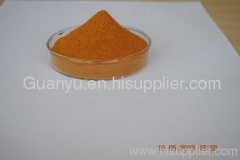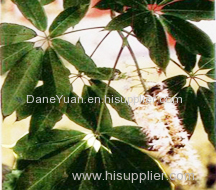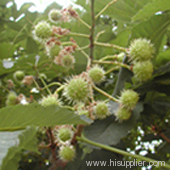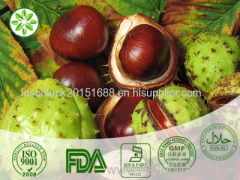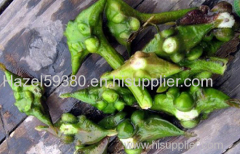
Horse chestnut extract
| Min. Order: | 1 Kilogram |
|---|---|
| Trade Term: | FOB |
| Payment Terms: | WU |
| Supply Ability: | 1000kg/week |
Company Profile
| Location: | China (Mainland) |
|---|---|
| Business Type: | Manufacturer |
Product Detail
| Means of Transport: | Ocean |
|---|---|
| Production Capacity: | 1000kg/week |
| Packing: | 25kg/drum or1kg/bag |
| Delivery Date: | within 5 days after payment |
Product Description
Active Ingredient: Aescin
Specification: 20%
Test Method: HPLC
Every autumn, the shady horse chestnut tree (Aesculus hippocastanum) produces prickly fruits containing one to three large seeds, or "nuts." In the 1800s, European doctors figured out that an extract made from these seeds could help treat varicose veins, hemorrhoids, and other disorders caused by fragile veins and sluggish circulation.
Today, horse chestnut seed extract is still used for these conditions and is particularly popular in Germany, where it ranks among the most common prescription herbal remedies (after ginkgo biloba and St. John's wort).
The horse chestnut is also known as the Spanish chestnut. Never take the seeds right off the tree to make a home remedy; the seeds (and other parts of the tree) are poisonous. To be safe, they must be carefully treated to extract the active ingredient.
Also, don't confuse seeds from the horse chestnut with seeds ("nuts") of the sweet chestnut (Castanea vesca), a tree that bears delicious chestnuts, ideal for roasting and stuffing into holiday turkeys.
Health Benefits
Scientists examining the seeds of the horse chestnut identified the main therapeutic ingredient, aescin, which is sometimes described as a group of chemically related substances called "escin."
Aescin reduces inflammation and tones up vein walls, allowing blood to flow back to the heart more easily. It appears to accomplish this by plugging up minute holes and microscopic leaks in the tiniest blood vessels, the venules, and in the capillaries. In reinforcing the strength of veins, horse chestnut is believed to also promote their elasticity and prevent swelling and long-term damage to them.
Specifically, horse chestnut seed extract may help to:
Treat the discomforts of varicose veins and other leg vein problems. Symptoms of varicose veins and the closely related condition known as chronic venous insufficiency--swollen legs, pain, and heaviness in the legs, and calf cramps (especially at night)--may well subside with horse chestnut treatment. In parts of Europe, the herbal extract has been intensively studied for this use in particular, with numerous clinical trials cited in the medical literature.


